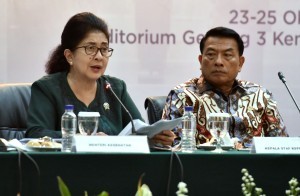Health Minister: Maternal and Newborn Mortality Rate Drop

Minister of Health Nila F. Moeloek accompanied by Presidential Chief of Staff Moeldoko on the press conference at the Building III of the Ministry of State Secretariat, Jakarta, Tuesday (23/10). (Photo by: Rahmah/Public Relations).
Indonesian Minister of Health Nila F. Moeloek said, since 2015 until now the maternal and newborn mortality rate continue to show a downward trend.
This is the result of the JKN (National Health Insurance) program which covers childbirth by health workers, which is now evenly distributed, the Minister said in the 4-Year Report on President Joko Jokowi Widodo-Vice President Jusuf Kalla Administration, in Jakarta, Tuesday (23/10).
According to the data of stunting in children from the Central Statistics Agency (BPS), in 2013 reached 37.2 percent but now decline to 30.8 percent, the Minister said, adding that the whole process of stunting eradication is the task of the Ministry of Health.
This task is not only to provide additional food or giving blood-added tablets to adolescents, but we also have to sensitively intervene by providing access to clean water and sanitation, the Minister said.
Nila also said that the Ministry is also actively involved in prevention of stunting in the regions through Integrated Health Post (Posyandu) by involving members of the Family Welfare Movement (PKK) so that it can move the wheels of economy in the region.
Regarding immunization on rubella measles in Java, the Minister said that the coverage reached 92.04 percent or 35 million people. However, she is still waiting for the immunizations final report on the areas outside Java.
According to Nila, almost 4 million children have been fully immunized and it can be said that Indonesia is currently polio-free. Still, the Government chose to remain cautious to avoid polio-outbreak cases as happened in Papua New Guinea.
On that occasion, the Minister also said that the JKN program participants now reached more than 200 million people, a significant increase from the previously 156 million people. Meanwhile, the subsidized participants increased to 92.4 million and next year it is projected to reach 96.8 million.
Indeed, it must be accompanied by upgrading the health facilities, Nila said, adding that the increase for hospitals is 22,624 units and primary health facilities such as health centers and independent clinics is 2,443 units.
The Government has built 256 community health centers (Puskesmas) in 49 regencies in the country and empowered 110 Puskesmas in border areas in 48 districts using affirmative Special Allocation Funds. We can see the construction of the puskesmas that was once in Sota on the border in Merauke Regency, Papua, now is getting better. We also provided official houses for health workers and ambulances and its equipment, the Minister said.
Similar actions are also conducted in Entikong health center, West Kalimantan, so Nila hopes that the local residents are no longer needed to get treatment out of Indonesia. (MAY/RAH/ES) (GWH/YM/Naster)








